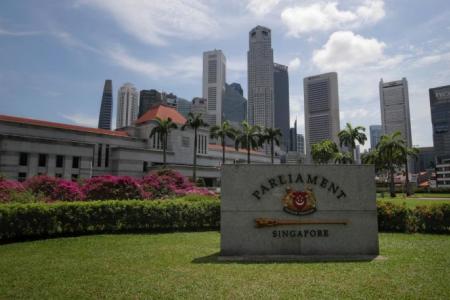MPs must be able to substantiate what they say in the House, says Speaker Tan Chuan-Jin
Parliament on Wednesday (Jan 19) explained its rules for conduct in the Chamber in a post shared by Speaker Tan Chuan-Jin, who said he expected MPs to be able to substantiate what they say in the House and would not hesitate to be firm when he has to be.
In a short Facebook note of his own, he said that if every MP speaks, debates and questions as and when he or she pleases, it would be inappropriate and Parliament would be chaotic.
In such instances, if he disallows MPs from speaking, it is because they have been out of order or there are no provisions for them to do so, he added.
"When that happens, my role is to ensure discipline and to maintain dignity and order in the House," he said.
An MP's conduct in the House is regulated by the Speaker and guided by certain rules that set out when MPs can speak and how they should do so.
Among the rules are that MPs are not supposed to speak unless they have been called upon to do so by the Speaker, and the latter can direct an MP to stop a speech "after determining the member is persisting in irrelevance or tedious repetition".
An MP also has to direct his speech to the Chair whenever he is speaking, and cannot address another member directly, such as by referring to "your speech" or "you said this".
In addition, an MP should not make unfounded and unsubstantiated allegations in Parliament.
These rules "allow for a dignified, orderly and effective conduct of proceedings, even as members have the opportunities to give speeches, clarifications and explanations on certain matters", said the post filed under Parliament's "Good to Know" folder.
The folder has explanations on other parliamentary proceedings and matters such as select committees and ministerial statements.
Parliament's latest post comes after this month's sitting, during which Non-Constituency MP Leong Mun Wai claimed on Jan 10 that he received feedback from residents that some teachers had practised vaccination-differentiated measures in schools, but could not substantiate what he said.
When given the opportunity to make a clarification on Jan 11, the Progress Singapore Party NCMP went on to restate his allegations instead. After several reminders from Mr Tan that he should not "make another speech" when giving a personal explanation, Mr Leong told the House that he got the information off a screenshot from a Telegram chat group that was sent to him by a Facebook friend.
Leader of the House Indranee Rajah, responding to the fact that Mr Leong made allegations based on a screenshot, issued a stern reminder to MPs to exercise their privilege responsibly.
Ms Indranee and Mr Tan had also reiterated this point on parliamentary privilege, after former Workers' Party MP Raeesah Khan admitted to lying in Parliament in a speech she made on Aug 3 last year (2021).
In its post on Wednesday, Parliament explained that a personal explanation is an opportunity for MPs to make a short statement to explain, justify or apologise for his or her conduct with regard to a particular question or occasion, or to correct an alleged misrepresentation.
Such an explanation can be made after question time, and can be done only after an MP gets advance permission from the Speaker.
The MP must submit the terms of the explanation to the Speaker beforehand, said Parliament.
It added that based on Standing Order 25, which sets out the rules for personal explanations, no controversial matter may be brought up during such an explanation, and no debate may arise upon the explanation.
During the Jan 11 session of Parliament, Leader of the Opposition Pritam Singh pointed out to Mr Tan: "When a personal explanation is made... you would actually receive the whole statement in full. So the assumption was, when you mentioned personal explanation, you would have had sight of what Mr Leong was going to say."
Mr Tan said to Mr Singh that Mr Leong had written to him asking to make a clarification, "so he did not cite the specific issue of personal explanation, but that is the category I am putting it under".
On Wednesday, Parliament said other types of explanations in Parliament include ministerial statements made by ministers and other office-holders to explain important issues of public interest and clarifications by MPs on their previous speeches.
Mr Tan said that in most instances, MPs have been "responsible and matured in their behaviour and conduct, and there has been little need for me to crack the proverbial whip".
He added that he would not hesitate to be firm when needed, and that it would be remiss of him to do otherwise.
"I have stated before that I would take a more expansive approach to allow for freer debates in Parliament and have done so for all sides of the House. However, this doesn't mean that members can take liberties to do whatever they so wish," he said.
Parliament has 103 MPs, consisting of 92 elected MPs, two NCMPs and nine Nominated MPs.
Get The New Paper on your phone with the free TNP app. Download from the Apple App Store or Google Play Store now



